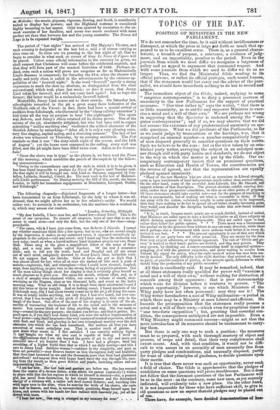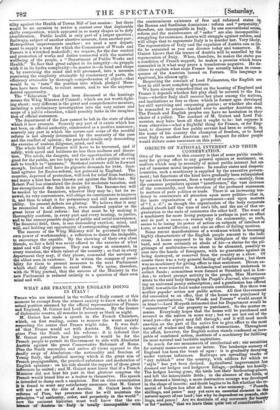TOPICS OF THE DAY.
POSITION OF MINISTERS IN THE NEW P AR LIAM ENT.
WE do not remember the time, be it said without invidiousness or disrespect, at which the press at large put forth so much that ap- peared to us to be excellent sense. There is, as a general charac- teristic, a breadth of purpose, a substance, a coolness of judg- ment, and an impartiality, peculiar to the period. Even in the journals from which we most differ we recognize a largeness of policy and an appeal to argument that command respect. And with some journals from which we used to differ we do so no longer. Thus, we find the Ministerial Globe reading to its official patrons, or rather its official proteges such sound lessons, that if the statesmen would but carry out the advice of the jour- nalist, we should have henceforth nothing to do but to record and admire.
The immediate object of the Globe, indeed, replying to some " sanguine contemporaries," is to deny a presumed increase of unanimity in the new Parliament for the support of practical measures. " Our view rather is," says the writer, " that there is so little unanimity, as to entitle and empower Ministers to exer- cise a mind and a will of their own." We are perhaps not wrong in supposing that the Spectator is reckoned among the " san- guine contemporaries"; and if so, we may observe that we did not assume the existence of any predetermined unanimity on spe- cific questions. What we did predicate of the Parliament, so far as we could judge by transactions at the hustings, was, that it comprised an unusual number—a number comparatively large— of men disposed generally to consider questions on their merits. Such we believe to be the case : but as the view taken by an esta- blished party writer, surveying the subject in an enlarged man- ner though still with party habits and standards, we do not object to the way in which the matter is put by the Globe. Our ex- sanguinary contemporary insists that on prominent questions, such as Education and Health of Towns, the constituencies are the reverse of agreed, and that the representatives are equally pledged against unanimity.
"Many of the new Members who are cited as accessions to Liberal strength, come in upon watchwords of local independence much rather than central reform. On the other hand, many of the so-styled Anti-Liberals, like Mr. Disraeli, will support reforms of that description. The present elections exhibit existing divi- sions, rather than prospective coincidence, on this as on other points of progress. Of these statesmen should take careful note—not for the purpose of truckling to what is unreasonable, but of making out what is reasonable in them. If they ran away with the notion, sedulously sought in some quarters to be impressed, that they have nothing to do but to spread all sail before steadily favouring gales, they would soon discover the deception lurking under this new-found nominal unanimity," "It is, in truth, because men's minds are so much divided, instead of united, that Ministers are called upon to take a decided initiative on all those subjects on which decision appears to them indispensable. They are called upon to lead,
rather than follow the public opinion. • There never was a Government less pushed on by the pressure from without in any °nimbi direction, while there never perhaps was a Government with more arduous work before it in every di.. rection it can look. • * • The present opportunity is one of that sort which Ministers of our party have not often possessed. They are secure for the time from very exigent adherents, or vigorous opponents. The rule of Divide and go- vern' is worked to their hand; parties are divided, and they may govern. They may govern, by chalking out a course commending itself to impartial opinion— grappling first with the greatest exigencies, and never waiting to receive from without the signal for action, when the right mode of action has once been ma- turely decided. The only, difficulty is the right decision: that arrived at, there is no party, or possible coalition of parties, at the present epoch, deference to which should delay the production of any public measures."
All this is excellently said. It may be remarked, indeed, that at all times statesmen really qualified for power will " exercise a mind and a will of their own," without waiting for distraction of councils among their opponents : that is poor statesmanship which waits for division before it ventures to govern. "The present opportunity," however, is one which Ministers of the Whig party have not often possessed : may they use it The Whig writer foreshadows a sort of Whig millennium—a period in which there may be a Ministry at once Liberal and efficient. He hazards the presupposition that the statesmen really possess a mind and a will of their own,—which even for propitious times is " une tree-forte supposition"; but, granting that essential con- dition, the consequences anticipated are not impossible. Even a Whig Ministry might command success—might so act that the introduction ntroduction of its measures should be tantamount to carry- ing. them. But there is only one way to such a position : 'the measures must be so prepared, with such thorough mastery of object and process, of scope and detail, that their very completeness shall extort assent. And, with that condition, it would not be diffi- cult to win assent in an assembly of men unusually free from party pledges and combinations, and unusually disposed, partly for want of other principles of guidance, to decide questions upon their merits.
It is true that there never was such an opportunity, never such a field of choice. The Globe is apprehensive that the pled.ges of
candidates on some questions will prove troublesome. But it does not follow that the foremost questions of the last Parliament will
be so in the next : on the contrary, some new ones, as yet scarcely indicated, will evidently take a new place. On the other hand, it is not impossible for those who have sufficient skill, to give to old questions so new an aspect that old pledges may he placed out of use.
There have, for example, been decided demonstrations of hoe- ti]ity against the Health of Towns Bill of last session : but there would be no occasion to revive a contest over that deplorable shifty composition, which appeared in so many shapes as to defy identification. Public health is only part of a larger question; Railways, subject of another abortive measure, form another part ; Metropolitan improvements another : we need a new depart- ment to supply a want for which the Commission of Woods and Forests is a wretched makeshift ; we require, for the due control and promotion of works and duties connected with the material wellbeing of the people, a "Department of Public Works and Health." To face that great subject in its integrity—to grapple with it in its hydra complexity—to master it—to bend and shape it, by exercising the mind and will presumed, into a measure possessing the simplicity attainable by consistency of parts, the efficiency attainable by thorough comprehension of object—that would be to "turn" the position into which pledged Mem- bers have been forced, to extort assent, and to use the unprece- dented opportunity. The " Education " that has been discussed at the hustings means the Whig Minutes of Council ; which are not worth fight- ing about: very different is the great and comprehensive measure, including a preliminary investigation into the very nature and scope of a public education, which possibly lurks in the imagina- tion of official statesmen.
The department of the Law cannot be left in the state of chaos which it now presents. Scarcely any part of it exists which has not been, on official authority, condemned as a positive nuisance ; scarcely any part in which the nature and scope of the needful reform is not already determined by the necessity of the case and the conflict of opinion ; the practical details only demanding the exercise of zealous diligence, mind, and will.
The whole field of Finance will have to be traversed, and if safely, with speed and boldness no less than coolness and discre- tion. The needs, the dangers, and the opportunities of effecting good for the public, are too large to make it either politic or even safe to truckle to "interests." Sectional interests will be forward enough. Ireland will have its gigantic demands for 1848. Scot- land agitates for Excise-reform, not gainsaid in England. The counties, deprived of protection, will look for relief from burdens; and many a hint has been thrown out against the Malt-tax. Sir Robert Peel has stimulated the desire for moderate taxation, and has strengthened the faith in its policy. The Income-tax will be needed by the financiers, whoever they may be ; but its re- newal, its very convenience, will oblige its continuators to improve it, and thus to adapt it for permanency and still more unmixed utility. Its present defects are glaring. We believe that it may be reconciled to all classes, nay, even rendered popular as the great lever of fiscal reform : but that must be by making it thoroughly conform, in every part and every bearing, to justice, and to the utmost possible degree of public and social convenience. The financial field, then, is one demanding exertion, mind, and will, and holding out opportunity of corresponding amplitude.
The success of the Whig Ministry will be governed by their own power of workmanship ; a reflection to daunt the incapable, to encourage the capable. By the showing of their own close friends, so fair a field was never offered to the exercise of what mind and will they possess. They can range at command, in every vocation, the whole talent of the country ; so that in every department they may, if they please, command the services of the ablest men in existence. It is within the compass of possi- bility for them to present measures to the next Parliament which shall defy others to excel them. We agree, therefore, with the Whig journal, that the success of the Ministry in the new Parliament is reduced entirely to a question of their own mind and will.



























 Previous page
Previous page